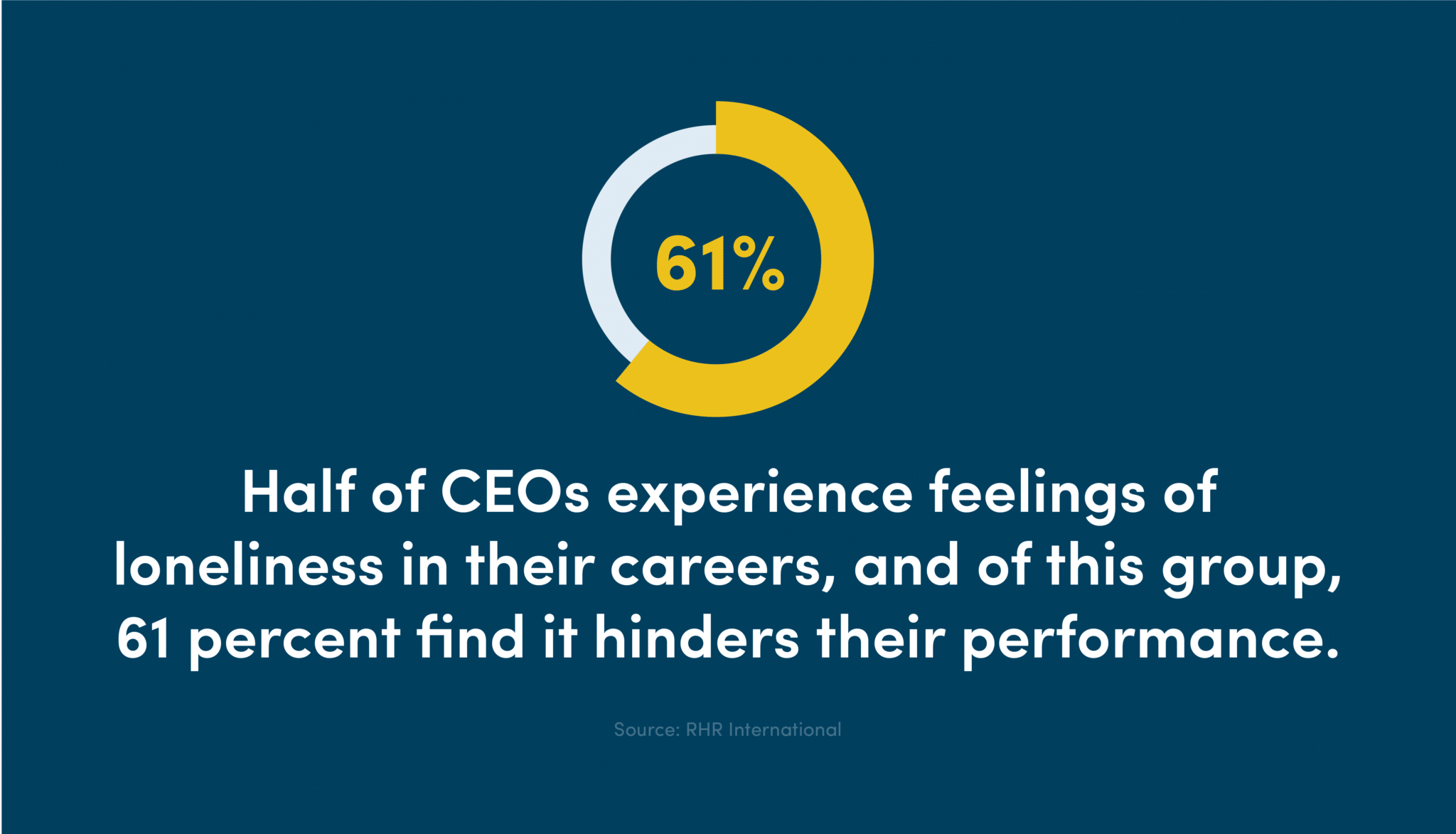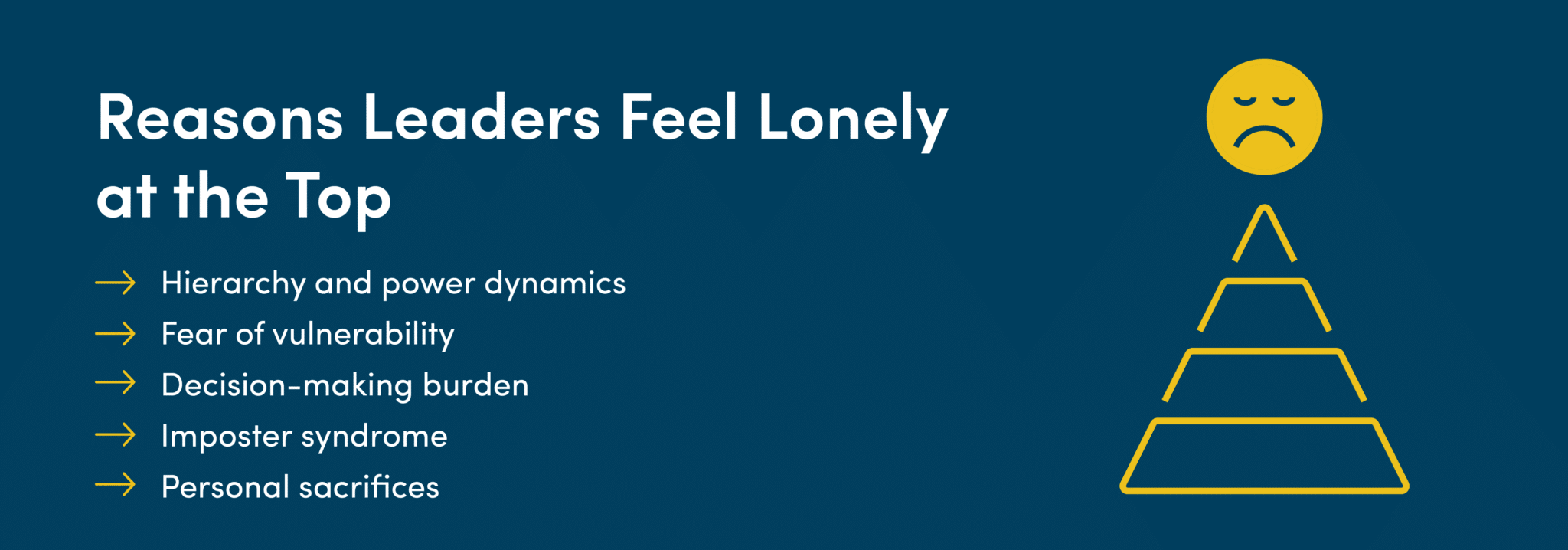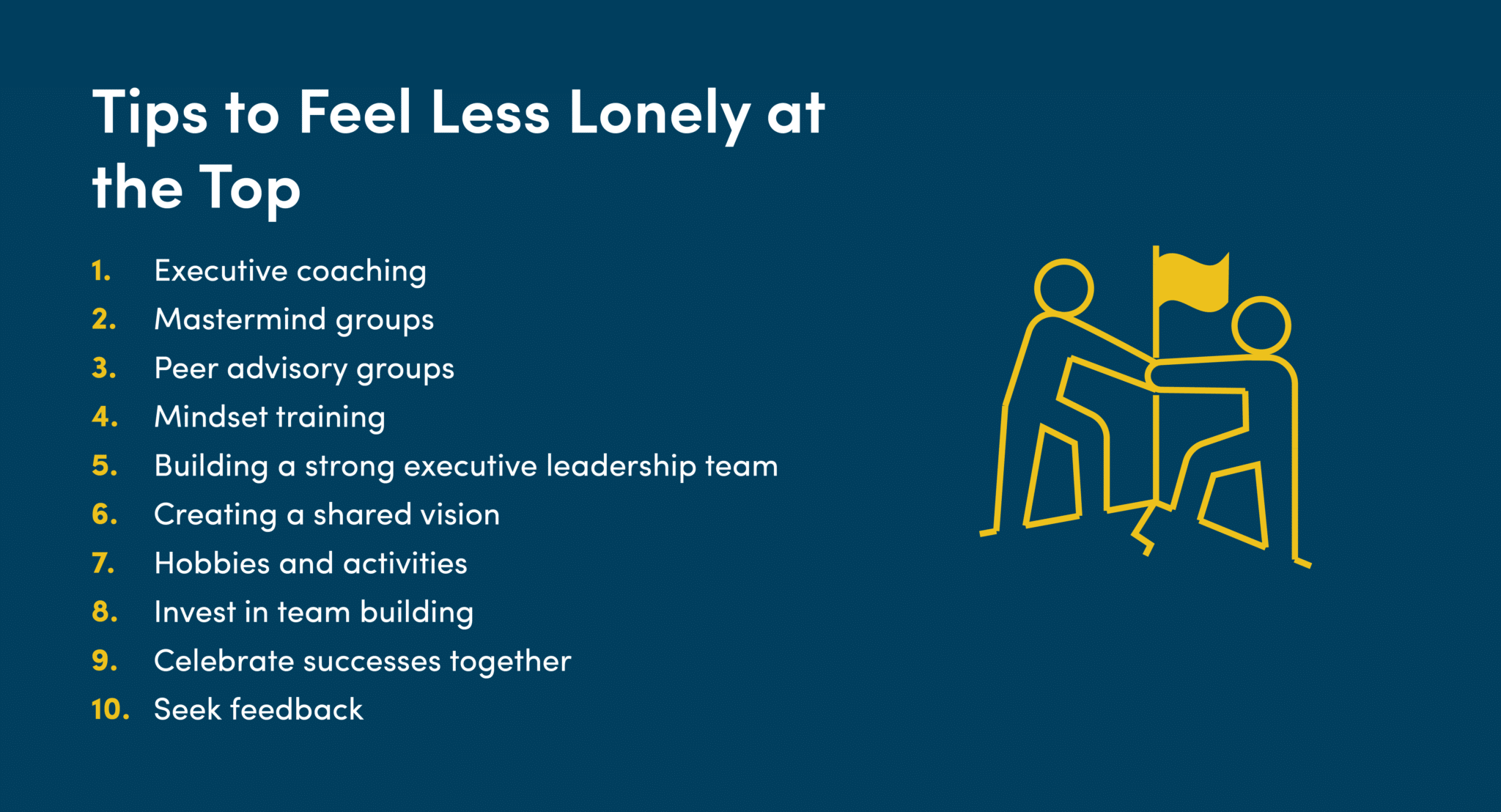Why Leaders Feel Lonely at the Top

It’s a feeling so commonly held by successful people that it’s become an idiom: “It’s lonely at the top.”
This idiom speaks truth for many executives, and research shows that these executives aren’t alone in how they feel. A survey from RHR International found that half of CEOs experience feelings of loneliness in their careers, 61 percent of whom believe that this feeling hinders their performance.

Additionally, a 2018 study published in the Journal of Leadership & Organizational Studies concluded that senior managers are lonelier inside and outside of work because of the demands of their roles. This is especially true for executives like CEOs, who have no true peers at work.
Fortunately, no one has to be a lonely CEO. There are multiple ways for successful individuals to form relationships and friendships with others in similar positions. So, with that in mind, let’s look at why leadership is lonely and what you can do about it.
- Why Is It Lonely at the Top?
- How Can You Address Loneliness at the Top?
- Key Takeaways: How to Feel Less Lonely at the Top
Why Is It Lonely at the Top?
At first glance, becoming a top executive or CEO would seem to be a dream come true. Power, prestige, and wealth are all attributes people strive for, so how could there be any significant downsides? However, several factors can make it lonely at the top, to the point where a CEO may wonder if the perks are all worthwhile.
Here’s a breakdown of the different elements that can make leadership so lonely.

1. Hierarchy and power dynamics
When you’re a regular employee, it’s natural and normal to spend time with other employees. In fact, three-quarters of people (76 percent) say they have a close friend at work. It makes sense because that’s where most of us spend our time, and we’re often close to others for extended periods.
As a CEO, however, that power dynamic shifts substantially. Now, you can’t just “hang out” with other workers because you’re in charge. Everyone acts differently around their boss, even subconsciously. Also, as an authority figure, you have a responsibility to take one’s actions into account. For example, if a subordinate makes a rude comment or does something wrong, you can’t just look the other way. Hierarchy and power dynamics are some of the top contributing factors to CEOs feeling lonely at the top.
2. Fear of vulnerability
Because becoming an executive comes with so many perks and advantages, everyone is looking for ways to rise up to the top. So, there’s a lot of competition for your position, meaning there’s always a target on your back.
Making matters worse is that your actions are highly visible to everyone within the company. If an entry-level worker makes a mistake, it can likely be corrected and forgotten. However, if you make a mistake as the CEO, it could cost money and potentially force you out of a job.
Executives also might hold the feeling that they need to project confidence and strength at all times, which can make it difficult for them to express vulnerability. The fear of feeling weak or uncertain can make it challenging for leaders to share their concerns and challenges with those around them, contributing to feelings of loneliness.
3. Decision-making burden
A big part of being a CEO or top executive is having strong decision-making skills. However, your decisions can affect everyone at the company, putting extra stress on each one of your actions. This stress can affect your ability to connect with others, particularly when confronted with poor-performing workers or managers.
Overall, the weight of these significant decisions can be isolating, as there may be few individuals within your organization who can share the burden.
4. Imposter syndrome
Impostor syndrome is the feeling that you don’t belong in your current position, no matter how hard you worked to get there. This condition affects almost every profession, including college students, teachers, doctors, lawyers, and more. While you should have all the confidence to do your job, you may wind up second-guessing yourself at every turn.
This syndrome is another reason why leadership is lonely. Some can’t become too attached or open up to others, lest they be discovered for the “impostors” they are. It can be much harder to be yourself in a leadership position, so you feel isolated and cut off from the rest of the company. There’s always that lingering fear that if you let your guard down, it could spell the end of your career.
5. Personal sacrifices
One of the most critical struggles you might face on the road to success is where to focus your time and attention. Individuals often have to choose between relationships (i.e., family) or their careers. Along the way, you’ve likely had to sacrifice personal friendships or intimate partnerships in favor of advancing your professional self.
So, while you may have “made it’ to the top, it’s natural to think about what you might have missed along the way. Also, if you had to sacrifice these relationships before, what’s to stop you from having to do so again? The pressure of success doesn’t disappear once you become a CEO or executive. Instead, it may even increase now that your actions and decisions can affect an entire company.
How Can You Address Loneliness at the Top?
Thankfully, you don’t have to be a lonely CEO forever. By being proactive about leadership development and incorporating relationship-building strategies, you can make friends and form bonds inside and outside your career. Here are our top methods for making it less lonely at the top.

1. Executive coaching
Working with an executive coach can help you learn ways to make friends and build positive relationships in your life. Because a coach has been through similar circumstances, they can offer insightful advice you couldn’t get elsewhere. Sometimes, your coach may have been a lonely CEO at one point and learned how to overcome it.
By working with an executive coach, leaders will push themselves to grow while giving themselves the gift of mentorship. Executive coaches listen to problems and provide real feedback, something many executives can’t get at work.
Sure, an executive coach can’t be workday buddies, nor can they share the burden of responsibilities, but they can be a great guide. They’ve been there, done that. Every executive coach has made their share of tough decisions, likely experienced loneliness, and come out the other side to tell the tale.
2. Mastermind groups
Some of the finest minds in history rarely felt lonely at the top—instead, they reached the top and climbed higher. Why? Because they sought worthy peers to challenge and hold them accountable.
This is called a mastermind group. Napoleon Hill, author of “Think and Grow Rich,” wrote that mastermind groups allow executives to accomplish more in a year than an entire lifetime of working alone.
Peers are key to the success of these groups. When executives open up about goals, problems, and loneliness in a mastermind group, they can see that others have similar issues. Better yet, these others are willing to listen, provide advice, and hold the executives accountable for their goals.
It’s hard to feel lonely amid a group of aspirational people who push each other toward greatness.
3. Peer advisory groups
One of the top benefits of peer advisory groups is bringing together the best parts of executive coaching and mastermind groups.
An executive who attends a Vistage group will quickly get to know the executive coach who leads the group. The coach will give feedback, listen to problems, and push executives to be the best versions of themselves. These coaches will also help expand the group’s horizons by bringing in outside experts.
Meanwhile, the other members of the group—each from different industries—will talk about their successes and struggles, including loneliness. This allows other executives to see that other executives, even in far-flung industries, experience their same fears, hopes and dreams.
Taken together, Vistage groups foster a powerful experience. They allow executives to see that they aren’t so alone—there are others on their same path.
4. Mindset training
Stanford University Professor Carol Dweck has spent her career researching the growth versus fixed mindset. People with a fixed mindset believe that their skills are capped out—those with a growth mindset believe that they can always learn more.
When executives change their mindset from fixed to growth, the world opens to them. A growth mindset gives executives permission to learn from everywhere and everyone. As Dweck writes, those in the growth mindset move away from “a judge-and-be-judged framework to a learn-and-help-learn framework.”
“Their commitment is to growth, and growth take plenty of time, effort, and mutual support,” Dweck writes. And that support, which an executive will give and receive, makes the world a less lonely place.
Having a growth mindset is one of the most valuable leadership qualities you can possess. Best of all, you can apply this mindset to every aspect of your life, both personally and professionally.
When it comes to loneliness, a growth mindset helps you shift your focus to be more positive. Instead of asking yourself, “Why is it lonely at the top?” you can start figuring out strategies to combat or overcome that loneliness. For example, you can seek peer advisory groups or participate in structured activities outside of work. When no one knows who you are or what you do, it’s much easier to be yourself and shrug off the challenges of your position.
5. A great executive leadership team
A big reason why leadership is lonely is that you’re often making decisions by yourself. So, one way to alleviate that problem is to create an executive leadership team (ELT). An ELT is a valuable resource for combating loneliness and helping strengthen the company and push it to new levels of success.
At its core, an ELT comprises the top leaders and managers within the company. Because everyone is on equal footing, there’s less of an imbalanced power dynamic, and it’s easier for everyone to share ideas and collaborate openly. Plus, by having strategic conversations about the business, it’s easier to get out of your own head and start expressing yourself more openly. Once you can start doing that, you’ll feel less lonely at the top.
6. A common vision
It’s tough to feel lonely when your team shares your vision. And a shared vision is exactly what will bring employees closer to executives, according to a survey cited in Harvard Business Review.
The survey found that 72 percent of employees and 88 percent of those in senior roles want a leader who is forward-looking. With a more willing group of employees and executives, we’re willing to bet the top is less lonely.
7. Hobbies and activities
Executives seeking excellence at work may also find value in seeking excellence outside of work. A great hobby or group activity allows for some play time, which helps reduce stress and increase connection with others.
For example, a paper published in the Journal of Psychology of Science and Technology finds that Nobel prize-winning scientists are 2.85 times more likely than non-winners to have an artistic hobby, such as acting, dancing, taking photographs, or even blowing glass. In business, one example is Goldman Sachs CEO David Solomon, who also DJs under the moniker DJ D-Sol.
While DJing may not be for every executive, an outside hobby is a great way to play, master a new craft, and feel connected.
8. Invest in team building
Part of your job as CEO is ensuring everyone works well together within a team setting. While managers and supervisors handle daily operations, you should also step in and verify the health and status of each team. Sometimes, you may discover conflicts and other internal issues that threaten the entire team’s success. In those instances, you must step in and provide valuable leadership.
This process can help you feel less lonely because you’re actively engaged with the day-to-day workings of the business. Plus, as you practice your active listening skills, you can become a better, more appreciated leader. Again, this step isn’t an invitation to become buddies with specific employees, but it helps you articulate yourself and become more social at work.
9. Celebrate successes together
Everyone likes to be celebrated and appreciated, no matter how small their victory or accomplishment. As an executive leader, you should pay attention to the small successes that add up to continued growth and prosperity for the business. While you don’t have to acknowledge every task, you can still take time to celebrate benchmarks and goals.
For example, you can commend specific individuals or teams for meeting their objectives ahead of schedule or under budget. You can also celebrate individual accomplishments like extended workloads or overtime hours worked to achieve a project’s goal.
Even something as simple as birthday recognition can positively impact the company. Also, when you’re proactive about celebrating successes for others, they’re willing to do the same for you, helping you feel less lonely.
10. Seek feedback
Finally, being a leader doesn’t mean you know everything. In fact, one of the best leadership qualities you can have is admitting you don’t know it all and requiring advice and insight from others.
So, soliciting feedback can help you see how you’re doing as a leader and where you can improve. This process also helps open the lines of communication, so workers and other executives feel more comfortable reaching out. There can be a tendency to avoid the boss unless necessary, but when you ask for feedback regularly, everyone is more likely to come to you for advice and insight. As a rule, open communication reduces isolation and loneliness.
Key Takeaways: How to Feel Less Lonely at the Top
Leadership is lonely, but it doesn’t have to be. Becoming a Vistage member allows you to expand your community and communicate with other executives in similar positions. Often, taking the first step can lead to a less lonely existence and help you discover new ways of looking at the world.
Leadership also doesn’t exist in a vacuum, and there are many tools and opportunities to help you feel less lonely. Whether listening to podcasts for executive coaches or participating in a Vistage group, loneliness doesn’t have to consume your life.
If you want to be part of a community of executives, find a Vistage peer advisory group near you.
Category : Wellness

